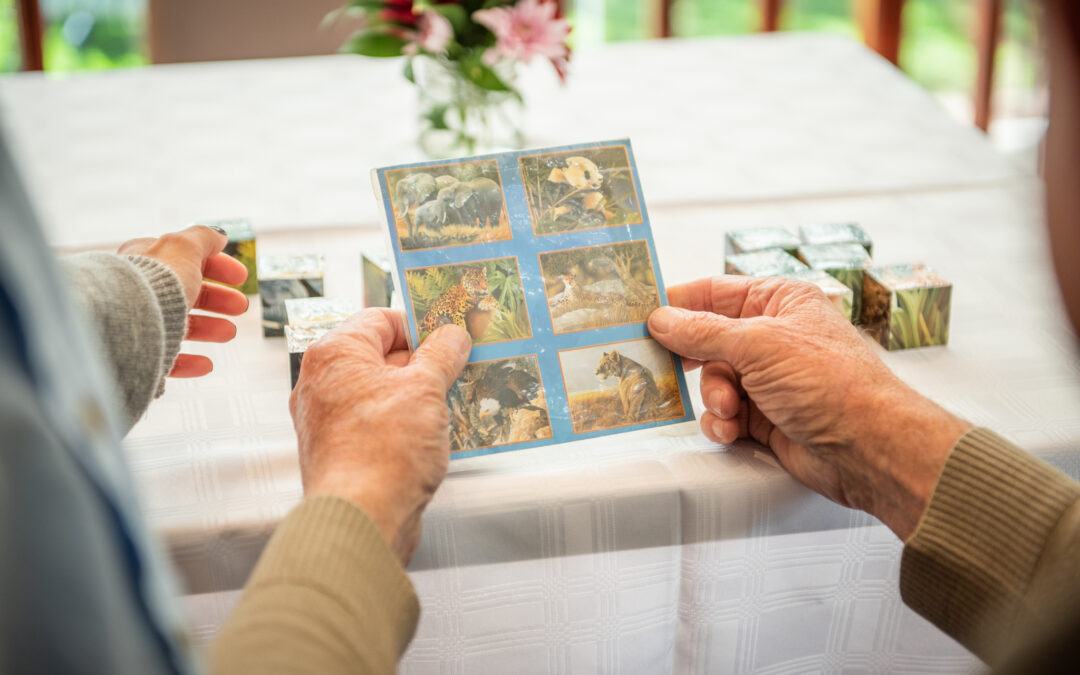Alzheimer’s disease, a progressive neurodegenerative condition, poses unique challenges for both individuals diagnosed with the disease and their caregivers. While pharmacological treatments are available to manage symptoms, there is growing interest in non-pharmacological approaches to Alzheimer’s care. These approaches focus on improving the overall quality of life of individuals with Alzheimer’s by addressing their cognitive, emotional, and sensory needs. In this article, we will explore non-pharmacological options in Alzheimer’s care, emphasizing memory-care activities, sensory stimulation, and ways to enhance the overall well-being of those affected.
Memory-Care Activities
One of the key elements in non-pharmacological Alzheimer’s care is the incorporation of memory-care activities. These activities are designed to engage individuals with Alzheimer’s, stimulate their cognitive functions, and evoke positive emotions. When it comes to our residents’ activities program, we encourage them to engage in activities that provide a sense of purpose, pleasure and relaxation. It is also important to encourage activities which provide mental stimulation and promote better health and wellbeing. Memory-care activities can include:
Reminiscence Therapy: Encouraging individuals to recall and share their life stories, reminisce about meaningful events, and look at family photos can foster a sense of connection and identity.
Music Therapy: Music has a remarkable ability to evoke memories and emotions. Caregivers can use music to stimulate cognitive functions and provide comfort and joy to Alzheimer’s patients.
Art and Craft Activities: Simple art projects and crafts can be effective tools for self-expression and creativity, even for those in the advanced stages of Alzheimer’s.
Interactive Games: Games like puzzles, board games, and trivia can engage cognitive skills, encourage social interaction, and provide mental stimulation.
Sensory Stimulation
Sensory stimulation is crucial in Alzheimer’s care, as it can help individuals connect with their environment and enhance their overall well-being. Here are some ways to incorporate sensory stimulation into care:
Sensory Gardens: Creating outdoor or indoor sensory gardens with different textures, colours, and scents can provide a stimulating and calming environment. The sensory gardens at Livewell are a beautiful place. Our residents enjoy leisurely strolls and the gardening activities designed for them.
Therapeutic Tactile Activities: Providing tactile activities such as textured fabrics, soft toys, or kinetic sand can help individuals connect with their sense of touch.
Sensory Tables: Sensory tables are versatile tools that can be used to engage multiple senses simultaneously. They can be filled with various materials such as sand, rice, or textured objects. Alzheimer’s patients can explore these tables by touching, feeling, and sometimes even tasting the contents. Sensory tables promote sensory stimulation and cognitive engagement, helping individuals connect with their surroundings in a tactile and interactive way.
Enhancing Quality of Life
Non-pharmacological approaches to Alzheimer’s care are ultimately aimed at enhancing the overall quality of life for both patients and their caregivers. Here are some ways to achieve this:
Tailored Care Plans: Personalised care plans that consider the unique needs, preferences, and abilities of Alzheimer’s patients are essential.
Education and Support: Caregivers should have access to education and support services to better understand Alzheimer’s and how to provide effective care. Support groups and resources can be invaluable.
Promoting Independence: Encouraging patients to engage in tasks they can manage independently, even simple ones, helps maintain their sense of dignity and self-worth.
Emotional Support: Alzheimer’s can be emotionally challenging for both patients and caregivers. Ensuring access to counselling and emotional support can significantly improve the caregiving experience.
Alzheimer’s care goes beyond medications and treatments. Non-pharmacological approaches, including memory-care activities, sensory stimulation, and a focus on enhancing the overall quality of life, offer innovative and holistic options for individuals living with Alzheimer’s. These approaches not only improve cognitive function but also promote emotional well-being and strengthen the bond between patients and their caregivers. By incorporating these options into Alzheimer’s care plans, we can make a meaningful difference in the lives of those affected by this challenging disease.
Alzheimer’s Care Options at Livewell Estates
At Livewell Estates, we understand that Alzheimer’s and dementia care requires a tailored and individualised approach. Our commitment to providing the best care possible is reflected in our personalised care plans. We recognise that each resident has unique needs, preferences, and abilities.
Our dedicated team of caregivers and healthcare professionals takes the time to get to know each resident on a personal level. We work closely with families to gather insights into their loved one’s life history, interests, and preferences. This comprehensive understanding forms the foundation of our personalised care plans. By tailoring our care plans to each resident’s specific requirements, we can create an environment that is not only supportive but also nurturing. Our residents receive the care and attention they deserve, ensuring that their physical, emotional, and cognitive needs are met with compassion and expertise.
This personalised approach extends to our memory-care activities and sensory stimulation programs. We design activities and environments that align with the individual preferences and capabilities of our residents. Whether it’s reminiscing through cherished memories, enjoying personalized music playlists, or engaging in creative arts and crafts, Livewell Estates strives to create a sense of belonging and purpose for every resident.
